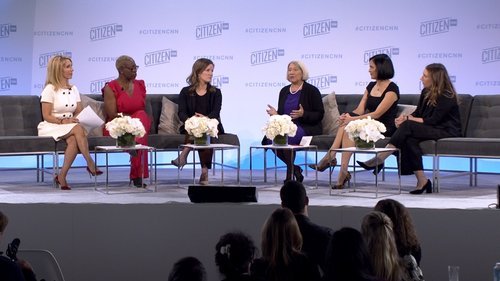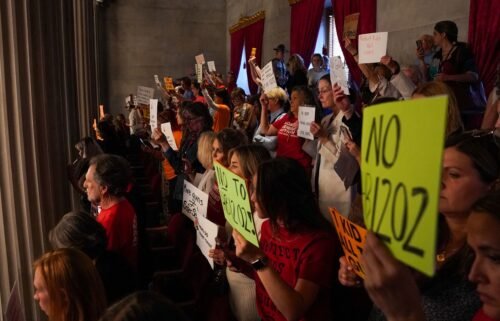Five badass women of the leading Democratic presidential campaigns: No longer ‘token women’ with seats at the table

Anita Dunn remembers a time in politics when it was almost unheard-of for women to be running political campaigns. Susan Estrich was Michael Dukakis’ campaign manager in 1988, but she was an anomaly until 2000, when Dunn and another woman, Gina Glantz, ran the Bill Bradley campaign.
Now, not so much.
Dunn, a senior adviser to former Vice President Joe Biden, appeared at Thursday’s CITIZEN by CNN event in New York with four other women in senior positions for leading Democratic presidential campaigns: Nina Turner, national co-chair for Bernie Sanders’ campaign; Lis Smith, senior adviser to Pete Buttigieg’s campaign; Lily Adams, communications director for Kamala Harris’ campaign; and Kristen Orthman, communications director for Elizabeth Warren’s campaign.
It is a show of force illustrating that the days of men running campaigns to elect other men are heading to the dustbin of history.
“I mean, all of you bring credibility to the campaigns you work for. All of you are seen as these senior strategists and enormously talented people. You’re not the token woman any longer. And I will tell you that there was a time when — and I think Senator Turner [too], we were the ‘women’ who were at the table. And it wasn’t that long ago, actually,” Dunn explained.
These women aren’t the only ones serving in top positions in Democratic presidential campaigns. Jen O’Malley Dillon is campaign manager for Beto O’Rourke and Maya Rupert holds the same title for Julián Castro. In 2016, on the Republican side, Kellyanne Conway, now senior counselor to President Donald Trump, made history as the first woman to lead a successful presidential campaign.
Working from the ground up
Smith has the unique position of trying to elect the first president who identifies as gay, Buttigieg, the mayor of South Bend, Indiana. She sees this campaign as different from any of the other 20 she’s worked on.
“I got in on the ground floor. There wasn’t this coterie of high-powered men around him, so I had the ability to really shape the campaign, and shape the direction we were going in, and shape the hiring. To me, it’s very important to empower women on campaigns,” she says.
Smith is particularly proud that 53% of the campaign is female, which she says helps ensure women are in leadership roles.
She argues that she is able to influence her boss is because he is 37 years old and didn’t grow up in what she called the “‘Mad Men’ generation.”
“He grew up at the same time as I did, where workplaces were changing, and where you did see women in leadership roles,” Smith said.
Bring who you are to the table
Former Ohio state Sen. Turner started her long political career in the Buckeye State. She was elected to the Cleveland City Council in 2006 and then appointed to the Ohio state Senate in 2008, but it always struck her how differently she was treated from her male colleagues.
“I remember very clearly that my colleagues were always referred to as Senator. Senator this, and Senator that. We could be in the same room … and I would be Nina. And for me, it is important that my first name is Senator, my last name is Turner, because you earned that title,” she says.
“Sometimes women are not given the kind of respect that they have earned, and that they deserve,” she adds.
Turner is now a national co-chair for Sanders’ presidential campaign, and while it means a great deal to her to be in her position, she believes the work is not over for her and other women. Her message is that women should bring who they are to the table and not be afraid to do that — a task she admits has been challenging, even for her.
“Sometimes it’s hard, especially if you’re an African American woman. You assert yourself, people want to call you angry, that stereotype. I want the world to know I am angry, I am mad as hell about what’s going on in the world. And angry black women are taking applications, so y’all can join us and be an angry black woman, too. But angry for good,” Turner explains.
New normals
Orthman hasn’t always worked for women. She is now the communications director for Warren’s presidential campaign, but she spent eight years with Majority Leader Harry Reid in his Senate office. The Nevada Democrat has told CNN that one of his proudest accomplishments in the Senate was being an early leader on making it easy for working moms to thrive in his office, which Orthman said had stuck with her.
“I thought it was the norm that a meeting would be scheduled for our foreign policy adviser at 4 so she could go pick up her kid at 5. Realizing that wasn’t the norm was pretty eye-opening, particularly on Capitol Hill, which I think is not that welcoming for working moms,” she explains.
For Orthman, working for someone who is trying to be the first female president is an honor, and with it comes new conversations that would happen only with a female boss.
“We had a week-long discussion about Elizabeth Warren’s pregnancy; if I was working for Harry Reid that wouldn’t have happened. But they’re different people, and I think all of us that have worked for different bosses would say, male or female, you do the best to communicate who this person is, and who and what they’re fighting for,” Orthman says.
Politics up close and personal
Adams has a truly unique perspective on politics, and the pressures that come with running for office as a woman. It’s likely because she saw her first campaign up close and personal at 3 years old.
Her grandmother, Ann Richards, ran for Texas governor in 1990 and won, becoming the first woman to capture the position in half a century. She famously held up a T-shirt at the state Capitol during celebrations that read: “A woman’s place is in the dome.” Adams’ mother, Cecile Richards, carried on the political torch as the former president of Planned Parenthood. She says she’s grateful to both of them for teaching her to be outspoken, funny, and hard-hitting.
“If I had not raised my hand, Ann Richards would have kicked my ass. So I think that I just had a benefit of being surrounded by examples of women who were not afraid to speak up and who were not afraid to shake the status quo and encourage that behavior among any of the kids that were in the family,” she says.
Adams thinks that for women and girls of her generation, that isn’t always the case.
“There’s, I think, especially even women and girls of our generation were raised, many of them, not to be funny, not to speak up, not to raise your hand,” she observes.
She has worked for her fair share of powerful women. In addition to her role now on the Harris campaign, she was Hillary Clinton’s 2016 Iowa communications director. She saw firsthand how her boss was treated differently.
“There was extraordinary discussion over what she was wearing, why was she wearing that? Did that convey the right message? Was she being too angry? Was her tone exactly right?” she explains.
Across the board, Adams still thinks women have a tougher time running for office, but she does believe it’s getting better. She hopes more women on campaigns and in office will make the environment better for future generations.
“I also think more women in power, more women in Congress, more women, hopefully, in the White House will make that better. But because they’re trying to make people see something that hasn’t been before, there’s no mold for it,” she says.
A new world of politics in the MeToo era
Campaigns are, by definition, raw and freewheeling.
But 2020 is the first presidential election cycle since the MeToo era began, and things are changing.
“Campaigns, which used to be like the craziest startup ever, right? … They’re like running a, having a huge amount of money come in with no infrastructure, no HR, no nothing, right, and just a bunch of people running around trying to win,” Dunn explained.
“I think that there is a much higher degree of sensitivity, and awareness,” she added.
Smith recalls working on campaigns in 2004 and 2006 and it was not unusual to see senior male staffers going out with interns.
“I think today you wouldn’t see that, and you can’t do that anymore and there’s no tolerance for that on the campaign,” Smith says.
Presidential campaigns, and these women running them, have had to reconcile how exactly to change a long-standing culture in politics, and the general consensus among the five women on the stage is things are getting better.
“We have trainings. We have rules about this. … Back then it was just, ‘Hey, we’re all having fun,’ but now it’s understood that that’s not OK and that that’s not how we do our campaigns. … That culture, really, I got to say, no spin, has come to an end, at least in this campaign and the last couple of campaigns I’ve worked on,” Smith says.
Consequences, Turner says, are key to making sure disrupting behaviors do not affect the campaign.
“You just can’t assume that everybody comes to the space and the place with the same experiences and/or value. So you have to set the tone. And that’s certainly what we have done in the Sanders campaign. And you have to make sure that there are consequences for behaviors that are not becoming of what the campaign reflects. And that’s whether you are a man or a woman,” Turner says.
When women become the majority in the workplace, Dunn points out, things will shift monumentally.
“This is a sea change that you’re seeing. The expectation that those policies are going to be in place and that senior management is going to actually take them seriously. So it’s not just a book on the shelf,” Dunn points out.
No longer an old boys’ club
The old boys’ club of politics is changing, and while a so-called “new girls’ club” may be growing, Turner warned that it is critical to include men in discussions about empowering women even more.
“That’s what got us into the mess that we’re in right now,” Turner says.
“The country is messed up right now because the boys had been having all the fun, and now women are here to make some crooked paths straight, but not at the expense of men. We need some co-conspirators,” she adds.
Adams gave a real-world example of how important is it to have people with different life experiences on these campaigns.
“A woman who is a part of our debate prep team had her child, gave birth, on debate two that night. And she was on calls with me all the way up until she went into that delivery room. … And so she has a different experience, a personal experience, when we’re rolling out our paid leave policy, when we’re talking about, as a campaign, what kind of paid leave should we provide to people on the campaign,” Adams says.
“So it’s not just women only, it’s women of color, it’s young women, it’s older women, it’s men, it’s LGBT community. So I think we just need to look at these campaigns holistically to think, are they reflecting the people that we want to actually cast the ballot for us?” she said.
Dunn looked around at the women sitting beside her and marveled.
“There’s not a one of you who couldn’t get hired on your merits and not because ‘We need to have a woman.’ It’s ‘Because we need Lis Smith’ or it’s, ‘We need Lily Adams’ because she’s going to give us a kind of instant credibility, talent and strategic advice that’s going to make our race look like it’s a real race. And that’s a sea change even from eight years ago,” Dunn said, beaming.



